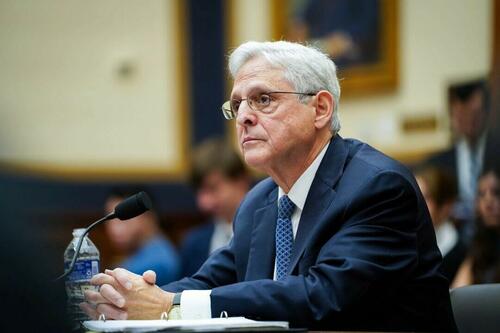
Authored by Matt McGregor via The Epoch Times (emphasis ours),
A group of Republican state attorneys general are pushing back against U.S. Attorney General Merrick Garland’s comments made in March at a church in Selma, Alabama, where he discussed using the Department of Justice (DOJ) to interfere in state voting laws.

Indiana Attorney General Todd Rokita, in a letter supported by 15 other GOP prosecutors, including Ken Paxton in Texas and Liz Murrill in Louisiana, stated that Mr. Garland’s comments are “concerning.”
“In your speech, you claimed that democracy is under attack by ‘discriminatory, burdensome, and unnecessary restrictions on access to the ballot,’” Mr. Rokita wrote. “In response to these allegations, you announced that you ‘double[d] the number of lawyers in the civil rights division’ and ‘launched the Justice Department’s Election Threats Task Force,’ signaling your intent to intrude on our states’ authority.”
Mr. Rokita called this a “weaponization of the DOJ” fueled by Mr. Garland’s personal views, which he called a “serious threat to the principles of federalism and separation of powers, but also to democracy and the rule of law.”
In the letter, Mr. Rokita said the U.S. Constitution is clear in its direction to leave state elections up to the elected representatives of those states.
“Any subversion of these clear mandates would be undermining our Constitution and law and order,” he wrote. “And we think your remarks undermine these principles in a few ways.”
Mr. Garland told the audience at the Tabernacle Baptist Church that his DOJ is challenging state laws that he said are placing unneeded restrictions on black voters. He said black voters are disenfranchised by these restrictions on mail-in voting, the use of drop boxes, and voter ID.
“That is why we are working to block the adoption of discriminatory redistricting plans that dilute the vote of Black voters and other voters of color,” Mr. Garland said. “We are holding accountable jurisdictions that fail to provide accessible vote centers for voters with disabilities. We are defending the ability of private individuals—not just the government—to bring lawsuits under the key provisions of the Voting Rights Act and the Civil Rights Act of 1964.”
Voter Fraud: ‘Very Real’
Mr. Rokita addressed Mr. Garland’s statement on voter ID laws, stating that contrary to Mr. Garland’s claiming they are discriminatory, they prohibit voter fraud, which he called “very real,” and referenced several occurrences.
“With these repeated instances of voter fraud, the DOJ should be championing these laws and encouraging enforcement of them,” Mr. Rokita said. “Individuals are required to use an ID to prove identity when driving a car, boarding an airline, buying cigarettes, or purchasing alcohol, and none of these identification requirements are considered ‘discriminatory’ or ‘burdensome.’ Requiring an ID to vote in an election is no different.”
He then called out Mr. Garland’s claim that states imposed “unnecessary restrictions” on mail-in voting and drop boxes.
“Numerous security risks exist with mail-in voting and drop boxes, and these methods of voting have led to the proliferation of election fraud,” he said, citing multiple instances.
He then referenced Mr. Garland’s comment in which he said the Voting Rights Act (VRA) has been weakened by legislation.
“This statement is factually incorrect,” he said. “When the VRA was enacted in 1965, a limited number of jurisdictions required federal oversight over its state election laws to combat discrimination. The original intent of the VRA was to ensure that the rights of Americans were not infringed upon at the ballot box based on their race.”
The law justifiably singled out states that were restricting the right to vote but had always meant to be “temporary legislation.”
“The Voting Rights Act is not under attack,” Mr. Rokita said. “Election security measures passed by state governments do not ‘make voting more difficult,’ nor are they dismantling the right to vote. Instead, common sense election laws strengthen our electoral process to ensure free and fair elections are conducted among the states; especially since voter fraud does exist.”
However, the right to vote is under attack by progressive elected officials, he said, who are allowing illegal aliens to vote in elections.
“In some cases, courts found these laws unconstitutional, and rightly so,” he said.
State attorney generals must defend their laws, he said, most importantly during a time when the Biden administration’s border policy has made them vulnerable to intrusions and violations of sovereignty.
“Finally, as you mention, the Department of Justice is ‘fighting back’ against these commonsense election security measures passed by the states in numerous ways,” he said.
The expansion of federal attorneys in the DOJ’s Voting Section of the Civil Rights Division and the election task force suggests a federal interference that goes against what a constitutional republic is supposed to be about, he wrote.
“The DOJ’s expansion serves as a direct attack on the states’ role in regulating elections,” he said. “Instead of working with the states to secure elections, you suggest weaponizing the DOJ through the civil rights division to undermine anything that you subjectively believe is a ‘threat [to] democracy.’”
Mr. Rokita said Mr. Garland is only concerned with using the DOJ to build up the vote of the Democratic party.
“And by using the justice system in this way, you diminish any democratic principles you claim to defend,” he said.
The Epoch Times contacted the DOJ for comment.
Authored by Matt McGregor via The Epoch Times (emphasis ours),
A group of Republican state attorneys general are pushing back against U.S. Attorney General Merrick Garland’s comments made in March at a church in Selma, Alabama, where he discussed using the Department of Justice (DOJ) to interfere in state voting laws.

Indiana Attorney General Todd Rokita, in a letter supported by 15 other GOP prosecutors, including Ken Paxton in Texas and Liz Murrill in Louisiana, stated that Mr. Garland’s comments are “concerning.”
“In your speech, you claimed that democracy is under attack by ‘discriminatory, burdensome, and unnecessary restrictions on access to the ballot,’” Mr. Rokita wrote. “In response to these allegations, you announced that you ‘double[d] the number of lawyers in the civil rights division’ and ‘launched the Justice Department’s Election Threats Task Force,’ signaling your intent to intrude on our states’ authority.”
Mr. Rokita called this a “weaponization of the DOJ” fueled by Mr. Garland’s personal views, which he called a “serious threat to the principles of federalism and separation of powers, but also to democracy and the rule of law.”
In the letter, Mr. Rokita said the U.S. Constitution is clear in its direction to leave state elections up to the elected representatives of those states.
“Any subversion of these clear mandates would be undermining our Constitution and law and order,” he wrote. “And we think your remarks undermine these principles in a few ways.”
Mr. Garland told the audience at the Tabernacle Baptist Church that his DOJ is challenging state laws that he said are placing unneeded restrictions on black voters. He said black voters are disenfranchised by these restrictions on mail-in voting, the use of drop boxes, and voter ID.
“That is why we are working to block the adoption of discriminatory redistricting plans that dilute the vote of Black voters and other voters of color,” Mr. Garland said. “We are holding accountable jurisdictions that fail to provide accessible vote centers for voters with disabilities. We are defending the ability of private individuals—not just the government—to bring lawsuits under the key provisions of the Voting Rights Act and the Civil Rights Act of 1964.”
Voter Fraud: ‘Very Real’
Mr. Rokita addressed Mr. Garland’s statement on voter ID laws, stating that contrary to Mr. Garland’s claiming they are discriminatory, they prohibit voter fraud, which he called “very real,” and referenced several occurrences.
“With these repeated instances of voter fraud, the DOJ should be championing these laws and encouraging enforcement of them,” Mr. Rokita said. “Individuals are required to use an ID to prove identity when driving a car, boarding an airline, buying cigarettes, or purchasing alcohol, and none of these identification requirements are considered ‘discriminatory’ or ‘burdensome.’ Requiring an ID to vote in an election is no different.”
He then called out Mr. Garland’s claim that states imposed “unnecessary restrictions” on mail-in voting and drop boxes.
“Numerous security risks exist with mail-in voting and drop boxes, and these methods of voting have led to the proliferation of election fraud,” he said, citing multiple instances.
He then referenced Mr. Garland’s comment in which he said the Voting Rights Act (VRA) has been weakened by legislation.
“This statement is factually incorrect,” he said. “When the VRA was enacted in 1965, a limited number of jurisdictions required federal oversight over its state election laws to combat discrimination. The original intent of the VRA was to ensure that the rights of Americans were not infringed upon at the ballot box based on their race.”
The law justifiably singled out states that were restricting the right to vote but had always meant to be “temporary legislation.”
“The Voting Rights Act is not under attack,” Mr. Rokita said. “Election security measures passed by state governments do not ‘make voting more difficult,’ nor are they dismantling the right to vote. Instead, common sense election laws strengthen our electoral process to ensure free and fair elections are conducted among the states; especially since voter fraud does exist.”
However, the right to vote is under attack by progressive elected officials, he said, who are allowing illegal aliens to vote in elections.
“In some cases, courts found these laws unconstitutional, and rightly so,” he said.
State attorney generals must defend their laws, he said, most importantly during a time when the Biden administration’s border policy has made them vulnerable to intrusions and violations of sovereignty.
“Finally, as you mention, the Department of Justice is ‘fighting back’ against these commonsense election security measures passed by the states in numerous ways,” he said.
The expansion of federal attorneys in the DOJ’s Voting Section of the Civil Rights Division and the election task force suggests a federal interference that goes against what a constitutional republic is supposed to be about, he wrote.
“The DOJ’s expansion serves as a direct attack on the states’ role in regulating elections,” he said. “Instead of working with the states to secure elections, you suggest weaponizing the DOJ through the civil rights division to undermine anything that you subjectively believe is a ‘threat [to] democracy.’”
Mr. Rokita said Mr. Garland is only concerned with using the DOJ to build up the vote of the Democratic party.
“And by using the justice system in this way, you diminish any democratic principles you claim to defend,” he said.
The Epoch Times contacted the DOJ for comment.
Loading…





